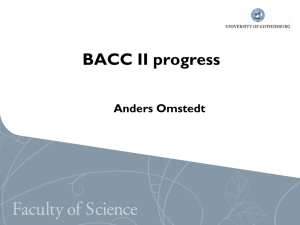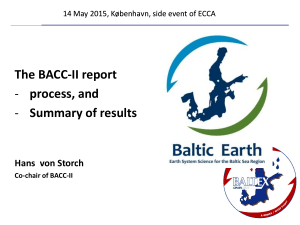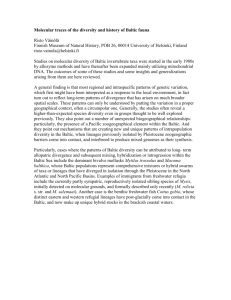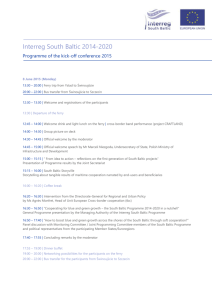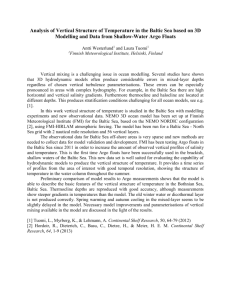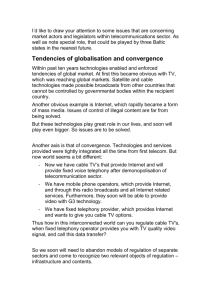Climate is changing
advertisement
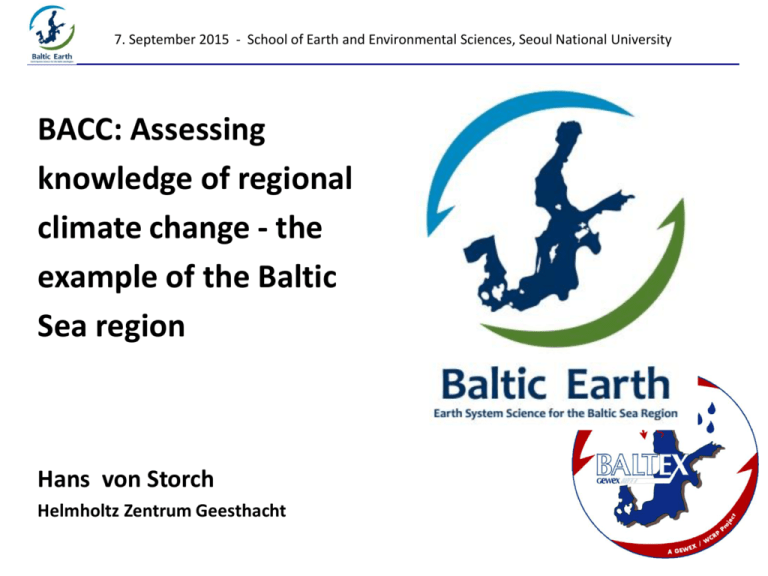
7. September 2015 - School of Earth and Environmental Sciences, Seoul National University BACC: Assessing knowledge of regional climate change - the example of the Baltic Sea region Hans von Storch Helmholtz Zentrum Geesthacht Overview 1. The global state of affairs, consolidated knowledge, IPCC, beliefs 2. The Baltic Sea region state of affair – the BACC (II) assessment. 3. Major scientifically open questions 4. Regionalization of BACC assessment IPCC: Global temperature development during “instrumental times” Consensus among climate scientists b) Bray, 2013 Climate scientists agree more and more that a) the world is warming („manifestation“) and that this warming can not be explained without referring to increased GHG levels („attribution“) IPCC presents and assesses the knowledge about climate change and climate impact on the global and all large regions (such as Europe). BACC is a little cousin of IPCC doing something similar but only for the Baltic Sea region. The two concepts are broadly similar, but deviate in some significant ways, in particular the non-involvement of governments by BACC. 5 BACC as „regional IPCC“ BALTEX Assessment of Climate Change for the Baltic Sea basin - BACC An effort to establish which scientifically legitimized knowledge about climate change and its impacts is available for the Baltic Sea catchment. Approximately 80 scientists from 12 countries have documented and assessed the published knowledge in 2008 in BACC 1; In May 2015, BACC-2 came out, with 141 contributing authors. The assessment has been accepted by the intergovernmental HELCOM commission as a basis for its judgment and recommendations. Principles → The assessment is a synthesis of material drawn comprehensively from the available scientifically legitimate literature (e.g. peer reviewed literature, conference proceedings, reports of scientific institutes). → Influence or funding from groups with a political, economical or ideological agenda is not allowed; however, questions from such groups are welcome. → If a consensus view cannot be found in the above defined literature, this is clearly stated and the differing views are documented. The assessment thus encompasses the knowledge about what scientists agree on but also identify cases of disagreement or knowledge gaps. → The assessment is evaluated by independent scientific reviewers. Printed at BACC–1 (2008) results – in short → Presently a warming is going on in the Baltic Sea region, and will continue throughout the 21st century. → BACC considers it plausible that this warming is at least partly related to anthropogenic factors. → So far, and in the next few decades, the signal is limited to temperature and directly related variables, such as ice conditions. → Later, changes in the water cycle are expected to become obvious. → This regional warming will have a variety of effects on terrestrial and marine ecosystems – some predictable such as the changes in the phenology others so far hardly predictable. Printed at Summary of BACC-2 (2015) • • • • • • • New assessment finds results of BACC I valid Significant detail and additional material has been found and assessed. Some contested issues have been reconciled (e.g. sea surface temperature trends) Ability to run multi-model ensembles seems a major addition; first signs of detection studies, but attribution still weak Regional climate models still suffer from partly severe biases; the effect of certain drivers (aerosols, land use change) on regional climate statistics cannot be described by these models. Data homogeneity is still a problem and sometimes not taken seriously enough The issue of multiple drivers on ecosystems and socio-economy is recognized, but more efforts to deal with are needed In many cases, the relative importance of different drivers, not only climate change, needs to be evaluated. Printed at Overall Summary of BACC-2 (2015) • • • • • • Estimates of future deposition and fluxes of substances like sulphur , nitrogen oxides, and carbondioxide depend on future emissions. Atmospheric factors are less important than emission changes. In the narrow coastal zone plant and animal communities have to adapt to changing climate and to land uplift. Climate change is a compounding factor for freshwater biogeochemistry. The effect of climate change cannot be quantified yet on a Baltic Basin wide-scale. Scenario simulations suggest that most probably the Baltic Sea will become more acid in the future. Increased oxygen deficiency, increased temperature, changed salinity and increased acidification will impact the marine ecosystem in several ways and may erode the resilience of the ecosystem. Increasing need for adaptive management strategies (forestry, agriculture, urban complexes) in the Baltic Sea Basin that deal with both climate change but also emissions of nutrients, aerosols, carbondioxide and other substances. Printed at Air temperature The warming of the low level atmosphere is larger in the Baltic Sea regions than the global mean for the corresponding period. Warming continued for the last decade Not in winter Largest in spring Largest for northern areas No recent ”stagnation” except for winter. Data sets Year Winter Spring Summer Autumn Northern area 0.11 0.10 0.15 0.08 0.10 Southern area 0.08 0.10 0.10 0.04 0.07 1 Linear surface air temperature trends (K per decade) for the period 1871-2011 for the Baltic Sea Basin. Northern area is latitude > 60°N. Bold numbers are significant at the 0.05 level. Data updated for BACCII from the CRUTEM3v dataset (Brohan et al. 2006) Same for 1871-2004 (BACC I): Annual and seasonal mean surface air temperature anomalies for the Baltic Sea Basin 1871-2011, Blue colour comprises the Baltic Sea basin to the north of 60°N, and red colour to the south of that latitude. summer r winter r Range of projected changes at the end of the 21st century: Temperatur summer r winter r Range of projected changes at the end of the 21st century: precipitation amounts summer r winter r Wind extremes 10yrv Range of projected changes at the end of the 21st century: Maximum wind Marine ecosysteme Higher Temperature are expected to go along with Stronger growth Earlier plankton blooms Modification of species composition Possibly advantages for blue algae Invading of foreign species Threatening of ringed seals (loss of ice cover) and lower salinity Changing species composition; immigration of new species Reduced oxygen supply in deeper waters, which may be associated with problems for fisheries (cod) Changed distribution and composition of zooplankton (food for small fish and fish larvae) and bottom-dwelling organisms. Detection and Attribution → Detection of non-natural influence on regional warming. Can be explained only if increased greenhouse gas concentrations contribute. Present trend consistent with model scenarios. → Detection of non-natural component in trends of precipitation amounts; present trends much larger than what is anticipated by models; thus no consistent explanation for the time being. → Lack of studies on detection of changes in other variables (e.g. snow cover, runoff, sea ice) → Lack of studies of the effect of other drivers (reduction of industrial aerosols, land use change) Printed at Climate science has provided sufficient knowledge for societies to decide about limiting climate change Yes, - Climate is changing, - We can not explain this change in terms of temperature without referring to elevated greenhouse gases - When looking at change in general, global climate change is one factor; others may be at work as well, sometimes dominantly so. - Climate change represents a challenge for human societies and ecosystems - Climate change can be limited by limiting the accumulation of greenhouse gases in the atmosphere. Whether societies agree on joining to actually limit climate change is legitimately a matter of policymaking, of values, of societal choices. Independently of mitigation, a need for adaptation remains – this is a regional and local issue We have not done our homework - studying jointly ongoing and possible future change. - separating the different causes for observed change. Climate science needs to deal more with options of adaptation for preparing for societal decisions. The more successful the climate change limitation policy is, the less adaptation is needed – but adaptation is needed, and is useful in any case, because of reduced vulnerability. The regional scientific community is asked to generate the needed knowledge. Again, the eventual decisions are a matter of policymaking, of values, of societal choices. Knowledge gaps 1. The issue of multiple climate change drivers (aerosols, landuse incl. urbanization) 2. The issue of multiple pressures on ecosystems and economy (eutrophication and related algae blooms, climate change, pollution, but also shipping and off-shore wind power and other off-shore activities, tourism, natural conservation and agriculture, fisheries and pollution) Printed at Regional attribution Observed CRU, EOBS (1982-2011) Projected GS signal, A1B scenario 10 simulations (ENSEMBLES) Observed and projected temperature trends (1982-2011) The observed (grey) trends are mostly consistent with what the regional climate models (green) suggest as response to elevated GHG levels. However, the observed warming was in all seasons larger than what the models suggested. Barkhordarian, pers. comm. Regional attribution Observed 1972-2011 (CRU, EOBS) Projected GS signal (ENSEMBLES) Observed (grey) and projected (green) precipitation trends (1972-2011) The observed changes are in all seasons, except for fall (SON), larger than those suggested by the regional climate models. The observed changes in winter (DJF) , summer (JJA) und fall (SON) are inconsistent with the models’ suggestion. In fall (SON) observation and projection even contradict each other. Barkhordarian, pers. comm. Perspectives - Regionalization of BACC assessment Have short version in national languages, with specification of change in in different countries (in prep. Germany, Poland, Belarussia) - Assessing knowledge about climate, climate change and impacts in other regions of the world: • Metropolitan region of Hamburg • North Sea region (NOSCCA) • Yellow Sea region
